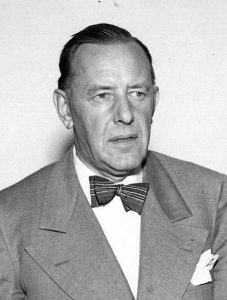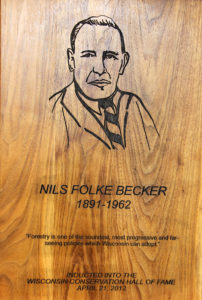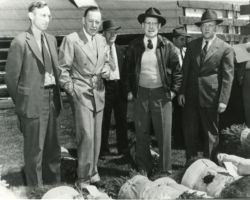1891 – 1961
Inducted 2012
“Forestry is one of the soundest, most progressive and far-seeing policies which Wisconsin can adopt.” — Nils Folke Becker
Wisconsin is rich in public and private forest lands. It is no exaggeration to credit Nils Folke Becker for helping to assure that.
A native of Sweden who received his education in chemical engineering in Germany, Folke Becker arrived in the U.S. in 1914. He became a U.S. citizen and worked in the paper industry in several locations in the U.S. and Canada until 1926, when he took the position of mill superintendent at Rhinelander Paper Co. He rose to the position of president in 1935, serving until 1954.
Almost immediately, he became a voice for sustainable forestry practices. It was a practical decision for a paper mill executive who saw the supply of available pulp from readily available sources shrinking. But Folke Becker had been preaching about sound forestry practices for years, emphasizing the multiple values that resulted.
He was a strong supporter of legislative and constitutional efforts to enhance sustainable forestry in Wisconsin. He is credited for marshaling support for a constitutional change to permit spending state funds for forestry, for enactment of the forestry mil tax legislation, for Forest Crop Law and creation of the county forestry program. The Wisconsin Forestry Hall of Fame called these “the greatest accomplishments for the state’s forestry program in any decade. Folke Becker was a key role player in making it all happen.”
 Folke Becker also helped found Trees for Tomorrow, a nonprofit organization established by paper companies for the purpose of reforesting northern Wisconsin and educating landowners and citizens about the need for proper land management. He served as the organization’s president from its founding in 1944 to 1961. He worked closely with the group’s first executive director, Mully Taylor (WCHF Inductee).
Folke Becker also helped found Trees for Tomorrow, a nonprofit organization established by paper companies for the purpose of reforesting northern Wisconsin and educating landowners and citizens about the need for proper land management. He served as the organization’s president from its founding in 1944 to 1961. He worked closely with the group’s first executive director, Mully Taylor (WCHF Inductee).
Folke Becker said of the organization, “I believe Trees for Tomorrow brings into focus what can be accomplished when industry, resource agencies, educational institutions and private individuals join forces behind a common objective — the social and economic welfare of the people of Wisconsin.”
In the mid-1950s, Folke Becker saw the need for a statewide forest pest control effort. At his urging, the Wisconsin Conservation Department established the position of forest entomologist, a program that was expanded to include forest entomologists and forest pathologists.
From 1955-61, he served on the Forestry Advisory Council to the then Wisconsin Conservation Commission. During his tenure on this committee, he helped to shape the forestry program for the remainder of the 20th century. This included the establishment of a center for forestry and watershed research in the Coulee Region. In his obituary, the Rhinelander Daily News stated that, “Folke Becker went beyond the expected and helped Wisconsin into a new era, one that saw the reforestation of much of the state and careful management of the resource for many different uses.”
Resources
Nils Folke Becker Wisconsin Forestry Hall of Fame Inductee, Wisconsin Society of American Foresters, 1990
Trees for Tomorrow, Merrill, WI Centennial, 1983
Folke Becker, Prominent in Paper Industry, Dies Here, Rhinelander Daily News, 1962
Trees for Tomorrow 75th Anniversary Report
Photos
These images may be used under the Creative Commons Attribution-NonCommercial-NoDerivatives 4.0 International License.

